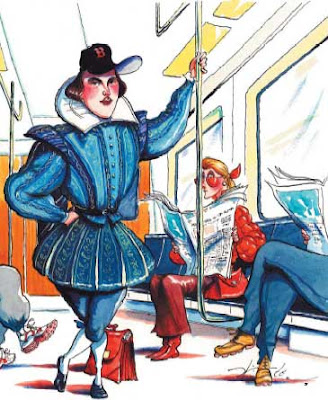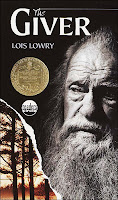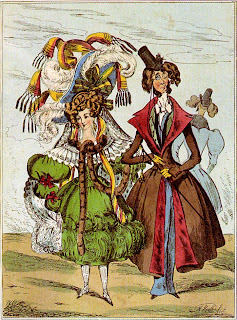
Sunday, September 26, 2010
Ubiquitous Shakespeare

Tuesday, September 21, 2010
Response

Monday, September 20, 2010
DreamZzZzZzZzzz...

Dreams. They're everywhere and they seem to be one of the few things that humans still haven't been able to fully understand. Some people think of dreams as the way our subconscious desires are made tangible, others think of dreams as the means by which we are given messages from beyond the grave. Everyone interprets their dreams differently and we can see in The Road that the father interprets his dreams as a type of warning. On page 18, Cormac McCarthy writes, "He (father) said that the right dreams for a man in peril were dreams of peril and else was the call of languor and of death." We can see that in his situation, the Father had to interpret his dreams as warnings in order to stay alert in the world that he lived in.
Sunday, September 19, 2010
Doorman's Tale
 Friends, now it is my turn to tell my tale
Friends, now it is my turn to tell my taleSunday, September 12, 2010
What's Going On?
- Woman, Man, and Child were survivors of some cataclysmic event on Earth
- Woman suicides because loses faith in her existence (most likely shot herself with the pistol)
- There are other survivors that would "rape, kill, then eat" the Man, Woman, and Child (maybe zombies?)
- The Child was not wanted by mother
Saturday, September 11, 2010
2012?

What a strange novel. I mean, personally I think that in the last few years directors, authors, writers, producers, EVERYONE has gone "apocalypse crazy." There have been hundreds of movies about aliens, zombies, climate change, devil-children, etc. in the last few years and I'm sort of tired of it. All of these incredibly original and genuine tales all have the same clear and concise message: we're fckd.
Monday, September 6, 2010
What Drives Us
DRAFT #2 FOR ESSAY ON GG AND CTS
Passion moves people. It drives humanity and it acts as an instigator for human actions and choice. Both Fitzgerald, in his novel The Great Gatsby, and Ondaatje, in Coming Through Slaughter, use symbols such as the green light and the cornet to portray the passions of both Bolden and Gatsby and how these led to their demise.
A symbol that Fitzgerald uses is the green light that Gastby could see across the bay from his house. This green light, which Gatsby stares at for hours on end from his house, symbolizes the love and wanting that Gatsby has for Daisy. The light stands for the hope that Gatsby has that one day he will meet Daisy again. Although Gatsby may have never acted on this urge to meet personally with Daisy after living close to her for so long, the green light is a physical representation of the still-present and burning love that he feels. Fitzgerald also leads us to realize that although our passions are wonderful things, they are strong and can lead us to misery and strife. We can clearly see that Gatsby’s acting on his passions ultimately led to the death of an innocent woman.
Ondaatje takes on a slightly different approach to this subject of passions. In his novel Coming Through Slaughter, Buddy Bolden is a character who seems to lead a double life. In one life, he is the average barber and on the other, he is an alcohol-drinking, prostitute-loving musician. Ondaatje makes Bolden’s passion be the music, in this case his cornet. In the beginning of the novel, we are shown a stark contrast between both of Bolden’s personalities and we are shown that when he performs, he reaches a completely higher level of being. Slowly, as the plot progresses, we can see that the passions in Bolden’s life are systematically driving him mad. Although his music was incredible, with his eccentric shows and mind-boggling mixes between gospel hymns and blues, it degenerated him. His passions ultimately let to his insanity.
As I have clearly demonstrated, both Fitzgerald and Ondaatje use symbols in their novels to show us the powerful, yet dangerous qualities of our passions. You can see it as either Gatsby’s green light or as Bolden’s cornet. Both authors are trying to show us that our passions move us wether we want them to or not, the important thing is being able to maintain control.
Sunday, September 5, 2010
Satire!
 This section of The Canterbury Tales, written by Chaucer, reminds me of what I've studied regarding the Protestant Reformation. The Protestant Reformation was a Christian reformation movement which denounced the Church's abuses (selling of indulgences- "The Pardoner's Tale) and resulted in a schism within the church. This movement began in 1571 and ended in 1648. I've done a little bit of research and I found that The Canterbury Tales were written at the end of the 14th century. This means that the Protestant Reformation had not begun yet in Europe. This leads me to believe that this book is a satire. It has all aspects of satire which we studied last year in our Pre-AP English course and is clearly proposing a social commentary that targets the vices of Europe in the end of the 14th century.
This section of The Canterbury Tales, written by Chaucer, reminds me of what I've studied regarding the Protestant Reformation. The Protestant Reformation was a Christian reformation movement which denounced the Church's abuses (selling of indulgences- "The Pardoner's Tale) and resulted in a schism within the church. This movement began in 1571 and ended in 1648. I've done a little bit of research and I found that The Canterbury Tales were written at the end of the 14th century. This means that the Protestant Reformation had not begun yet in Europe. This leads me to believe that this book is a satire. It has all aspects of satire which we studied last year in our Pre-AP English course and is clearly proposing a social commentary that targets the vices of Europe in the end of the 14th century.
The Raven
 In Edgar Allan Poe's poem The Raven, we can see a perfect example of the use of symbolism. The raven that is "perched upon a bust of Pallas" is a representation of the memory that was Lenore. The raven, a bird of ill-omen, also symbolizes death or the ending of a cycle. Using this information, we can deduce that perhaps what has happened is that the narrator has lost Lenore. We can't be sure whether she has died or perhaps she has left him, but we do know because of the desolate and grim tone that there has been a significant event that has hurt the relations between narrator-Lenore.
In Edgar Allan Poe's poem The Raven, we can see a perfect example of the use of symbolism. The raven that is "perched upon a bust of Pallas" is a representation of the memory that was Lenore. The raven, a bird of ill-omen, also symbolizes death or the ending of a cycle. Using this information, we can deduce that perhaps what has happened is that the narrator has lost Lenore. We can't be sure whether she has died or perhaps she has left him, but we do know because of the desolate and grim tone that there has been a significant event that has hurt the relations between narrator-Lenore.
Thursday, September 2, 2010
We're All F****d
 elieve that God has ordered them to kill, others believe that He has ordered them to give up all of their belongings, others believe that the second coming of Jesus has already come (Vissarion), etc. The point is, throughout time people have had hundreds (if not thousands) of beliefs and the amusing thing is that they actually base their sometimes absurd beliefs on documented and biblical documents. Because of these beliefs things like the crusades, the holocaust, and the genocides in Darfur and Rwanda have been occurring. There has been intolerance and discrimination ever since the beginning of human civilization and we can clearly see examples of these innate and dark human tendencies in Chaucer's The Canterbury Tales.
elieve that God has ordered them to kill, others believe that He has ordered them to give up all of their belongings, others believe that the second coming of Jesus has already come (Vissarion), etc. The point is, throughout time people have had hundreds (if not thousands) of beliefs and the amusing thing is that they actually base their sometimes absurd beliefs on documented and biblical documents. Because of these beliefs things like the crusades, the holocaust, and the genocides in Darfur and Rwanda have been occurring. There has been intolerance and discrimination ever since the beginning of human civilization and we can clearly see examples of these innate and dark human tendencies in Chaucer's The Canterbury Tales. So what, then, if people say bad things about marrying more than once? Lamech, Abraham, and Jacob were all holy men, as far as I can tell, and they all had more than a couple wives, as have many others like them. Has God ever expressly forbidden marriage before? Huh? Or has he ever commanded people to remain virgins all their lives? I know as well as you that St. Paul only recommended women to maintain their viriginity—he never ordered it. Giving advice and making commands are two different things, and he left it up to us to decide how to live. Besides, if God preferred virgins, then He would pretty much be against marriage, now wouldn’t He? And if people weren’t having sex, well then how would we make more virgins? No, St. Paul would never order anything that God himself wouldn’t want. Anyway, whoever wants to aspire to maintaining their virginity can do so, but we’ll see who comes out on top in the end.